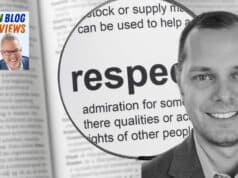How to find a job – Fortune on CNNMoney.com
Lots of people are on the market right now and I've had many discussions with people who are looking, specifically, to get into healthcare.
I'm not searching for a job, but I read this feature from FORTUNE since I'm a regular subscriber and I thought it's good to keep up on “best practices” for when I'm talking to others.
There's some advice here that seems particularly bad and horribly unethical.
The heading is:
“Work Your Rolodex: To score an in-person meeting, don't just ask for a job. Offer something in return, like intel on the competition.”
On the surface, the first part of the advice isn't bad – have a networking discussion and provide some value, such as general insights on the market or, say, about Lean in general or what advice you would give to the employer.
But “intel” on the competition — that starts to get into ethical gray area. And the way FORTUNE elaborated on this makes their advice seem outright sleazy:
A “headhunter” (normally, “recruiter” is the preferred term for a professional, but this guy seems to fit the headhunter term) named David Perry advises:
“When the hiring manager asks whether you have any questions, Perry recommends saying ‘Yes, as a matter of fact, I do. I understand your five competitors are such and such. What is it about ABC Company that makes you guys nervous?' Take notes, and when you get to your car, pick up the phone and call those competitors: “I just left an interview at XYZ Corp. Apparently, you're doing this and this, and it's keeping them up at night. Do you have time for coffee?”
I would NEVER hire somebody who pulled a stunt like that. Would you hire someone that unethical? If they're willing to spill information about another company, how would they treat their relationship with you and your company's information?
What do you think? Does everybody stand warned about David Perry and his ilk??
Please scroll down (or click) to post a comment. Connect with me on LinkedIn.
Let’s work together to build a culture of continuous improvement and psychological safety. If you're a leader looking to create lasting change—not just projects—I help organizations:
- Engage people at all levels in sustainable improvement
- Shift from fear of mistakes to learning from them
- Apply Lean thinking in practical, people-centered ways
Interested in coaching or a keynote talk? Let’s start a conversation.










Wow! Do you suppose there are any editors left screening for blatantly unethical recommendations? Fortune magazine has much higher standards in my experience of them.
/Dr. Pete
Wow! That is hard to believe…someone who would use those techniques to get the job would do the same in the job. To me, integrity is essential, and it wouldn’t matter how qualified the prospect. Fortune magazine needs to get their heads right.
My letter to the editor of FORTUNE:
Regarding your “How to Find a Job” issue, the advice from headhunter David Perry amounts to industrial espionage. Who in their right mind would hire a candidate who called from the parking lot with “intelligence” on another company? I’m not sure who should be more ashamed, Perry or FORTUNE for printing such unethical job hunting advice.
Mark Graban
Keller TX
Sadly there are probably several companies that would hire under these circumstances. I never would. I have heard from several companies who when a candidate started sharing deliberate secrets, the interview was immediately stopped, the person was walked off the premises, and the competitor was called and notified of what happened. Thanks for bringing this up Mark. In days like now when some people get a little desperate, its important that we stick to our values.
Goofy ideas often attract media attention, and this is unfortunately the case here. But just because something is ill-advised does not mean there won’t be any takers.
Perhaps some innocent and naive job seeker will actually try this. If so, I’m pretty sure the feedback he or she gets would make a great episode for a new reality TV show.
And who are we to determine if this advice is simply stupid? Unethical? Or truly illegal? Some people lie on resumes and fabricate references. For them this is probably seems like a great tactic.
Every client with whom I’ve worked with during the last 20+ years would out-of-hand reject such an offer from a prospective candidate (I use the word candidate loosely). Moreover, each of these companies would immediately consult legal counsel regarding their disclosure obligations to any competitor said “candidate” had mentioned.
I guess this just goes to show you that you can’t believe everything you read, even in Fortune.
Adam Zak
Wow, that’s really slimey. As bad as the garment industry is purported to be, you’d get shown to the door for that. Not that we don’t like gossip but this is beyond the pale.
Slimy indeed.
It would be legitimate for a candidate to show his cluefulness by talking knowledgeably about competitive activities by using *public information* drawn from his own research. But the tactics recommended by this headhunter are IMNSHO unethical.
You’re kidding me right? Employers twist situations to their advantage every day. Wake-up! This is great advice. Any interviewers who’re stupid enough to “confess” their corporate secrets to a job hunter deseerves what they get. We know the employer will use every advantage – why should job hunters?
I find it hard to beleive any company giving an interview would release such information to someone who was not already hired and signed to a confidentiality contract. The advice is rotten but so is the idea that a company would be so relaxed about what they’re worried about, especially in this economy.
Talking Trash…
I was debriefing an exceptionally qualified lean leadership candidate after an interview a few years ago.
I introduced this candidate to Company X who engaged us to identify a brilliant lean leader for their new lean journey. The lean leader position was newly created and reported to the CEO.
Half-way through our debrief, the Candidate mentions that he was surprised to learn Company X was preparing to reduce headcount. I was stunned by his comment as that issue wasn’t revealed when I visited the client and spoke to the CEO. I checked the box “NO” after the CEO of Company X emphatically stated to me that their last headcount reduction was 2 years ago (true) but had no plans to reduce heads anytime soon.
The Candidate asked me why I didn’t mention this to him. Astonished, I said I wasn’t aware of any forthcoming headcount reduction plans at Company X.
I asked the candidate if such was brought up during his interview with the CEO. He said no, wasn’t discussed. I asked “how did you learn about future headcount reductions at Company X”?
He said, while he was waiting in the CEO’s assistant’s office (for more than 20 minutes), he decided to dispose of his coffee cup. He did so in a waste basket next to the CEO’s assistant’s desk. Sitting in plain view in the basket was a confidential memo detailing headcount reductions for various departments. He said the memo was dated the day before. He said he didn’t retrieve the document since it exposed enough information by just standing over the basket and reading it.
Fast forward. CEO liked the candidate and wanted to offer him the job. Candidate diplomatically withdrew from the process (he already had a decent job). Then I asked the CEO about the forthcoming headcount reductions at Company X. My question startled him. There is more to this story but the point is: honesty rules in lean. Without honesty, you have waste you’ll never see or eliminate.
Jim Baran
Owner, Value Stream Leadership
http://www.valuestreamleaders.com
Jim – interesting story. I’m a bit confused.
Did the candidate remove himself from the picture because of the dishonesty from the CEO? Or did you remove the candidate because he “snooped” in the garbage can?
Interesting ethical dilemma of what to do if in the candidates shoes. If you see information in the trash (or on someone’s desk) is it fair game or do you have an obligation to NOT look?
I was taught by someone early in my career that you had an obligation to not look.
But, you don’t want to take a risk (such as leaving a good job) for something that might turn into a bad situation. So the candidate was protecting himself (and his family).
As long as he didn’t pass the information about Company X to any other company, I’d say he was OK ethically that he looked at the trash document.
Can you clarify and what do other readers think?
An obligation “not to look”? What does that even mean? Sure, don’t dig through the trash, but if it is where you wouldn’t expect to see it, like on top of the trash, how would you exactly ignore it. It’s like trying to NOT listen to the guy on the cellphone talking loudly next to you.
Point of clarification: Candidate removed himself a few days later after I got back to him with “new” information from the CEO.
My new information essentially validated what the candidate stumbled upon accidently in the trash. He said if I withheld that information from him, he would simply not work with me in the future. But said scenario is completely different working for someone who isn’t completely honest. I think he said something like “I work to close gaps”, not encourage them”.
Subsequently, the search was canceled weeks later because the headcount was eliminated.
So, all in all, it can prove worthwhile to talk trash before a job interview. Maybe an example of “waste” working to correct a deficiency.
Jim Baran
To Anon 2:36:
I’m not saying I completely bought into that philosophy, but the person was claiming that ethically you had an obligation to stop looking at material if you realized “I’m not supposed to see that.”
Let’s say you’re selling a product and the person you’re selling to has a document from the competition clearly spelling out the price they are offering. This person was saying you’d have an obligation to NOT look.
I think someone bombarding your ears with their phone conversation is a different situation all together, that’s them being dumb.
But now we’ve sort of hi-jacked the thread.
Jim — thanks for the clarification on the story.
Mark
You’ve got to be kidding. HR managers will use everything a candidates says against them… Instead of punishing the poor candidate you should be warning yoiur hiring managers about what they can and can not talk about during an interview. Go buy the book Guerrilla Marketing for Job Hunters 3.0 and read it to put the quote in to context.
David – OK, so you found a blog post from 2009.
You flat out advised people to do a job interview and then proactively CALL companies to give “competitive intel” that was provided in an interview.
What “context” makes that less than sleazy?
Your quote and comment doesn’t make me want to go buy your book. Did you read the other comments from others here, including a fellow recruiter?
Has your position on this changed in 12 years??